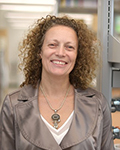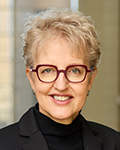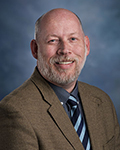
![]() Access a searchable transcript of this video by clicking the magnifying glass icon in the player.
Access a searchable transcript of this video by clicking the magnifying glass icon in the player.
Join panelists Linda Richards, Paul Kenny, and Dan Cox as they discuss key issues around Hiring Practices for Faculty positions at different types of universities. With moderator Lique Coolen, these experts will answer questions about best practices for applications, interviewing, negotiations, search committees, tenure, and promotion.
Learning Objectives:
- Become familiar with best practices for application processes.
- Understand how to be best prepared for the interview processes, including guidance around research chalk talks.
- Become informed about evaluation of publication and funding records.
- Introduce best practices for training and preparation for search committees.
Additional Questions Answered:
The speakers answered additional questions submitted by attendees that time didn't permit during the live webinar. Here are those questions and answers.
Q: Please be sure to address hiring at the associate and full professor level.
A: Answered Live
Q: Advice for postdocs/PhD students on how to figure out their research niche as faculty?
A: Work on projects that YOU are passionate about and believe are important and impactful, even if they are not the major focus of others in the field. Challenge your assumptions about the importance of those projects and the direction they are heading in regularly. Balancing these considerations will help you find your niche.
Q: Tips and strategies to transition from non-tenure to tenure track?
A: For application to tenure track positions while in a non-tenure position, all the same general comments and tips that were mentioned in the webinar apply. Generally, having funding would be a criterion to switch to the tenure track.
Q: Advice for getting application out of the stack and into an interview?
A: Clearly written, exciting ideas for future research program, and include a cover letter.
Q: If I do not have a grant but have a good research proposal and publication, how would it go?
A: You do not need a grant to be competitive for a faculty position, but you do need to have a research plan and supporting data that can be submitted to funding agencies and is a good fit with the hiring department.
Q: How could someone improve their network if they are located in a different geographical area?
A: Interactions at scientific meetings are a great way to network.
Q: Is a postdoc required?
A: Yes. For tenure-track faculty positions that have a research requirement, a postdoc is required. Postdoctoral training allows for further gaining of skills.
Q: For those seeking to switch institutions, asking for letters in an early stage of a job search can be awkward. At what point do those letters become required? Is it sufficient to provide names of references at an early stage?
A: There will be differences in when references are contacted. But when you apply for positions and especially if you are invited to on campus visits, it may be difficult to keep this private. When to communicate with your current chair can indeed be a difficult question especially if you are leaving an environment that is not supportive. But if the environment is a supportive one, communicating with your chair early in the process is advised.
Q: Dr. [Paul] Kenny said his institution does not put out an open search. Does this mean the members of the search committee recruit people to apply for a position?
A: By this I meant that we run “strategic” faculty searches; we seek candidates with expertise in specific areas of neuroscience that we think will strengthen our overall program and our community. By contrast, some departments will run “open” searches, when the precise area of neuroscience is less important than the overall quality of the candidate(s).
Q: What is expected generally in chalk talk?
A: Some things I look for are: the ability to clearly communicate the major research question(s) you are interested in and to explain why they are important, a clear plan for how to establish your independent research program, evidence that you’ve considered some of the major hurdles you’re likely to encounter and devised appropriate mitigating strategies, a well-crafted plan to obtain funding to support your research program (e.g., the aims of your first R01 application), and a plan that is feasible and compelling.
Q: What are you looking for in a Zoom interview? What should be emphasized outside of the research statement or CV already provided?
A: Answered Live
Q: What would be one's response if some faculty at the host institute asked whether the candidate has applied for positions elsewhere and details on the same?
A: This is not an appropriate question to ask early in the process or during the interview. You do not have to answer this question and instead express your reasons why you are interested in joining the host institution. This question may arise during the negotiation phase and at which time you need to be honest and transparent (don’t play games).
Q: When we are in an interview, how can we ask about how the institution and colleagues see the work life balance and if they value family, resources for family, maternity leave, etc.?
A: Answered Live
Q: What are some of the best answers for the question, "Why your institution?"
A: Answered Live
Q: For one-to-one interviews, do we need to only focus on talking about research? What if the person who I am going to meet is working in a very different field?
A: Answered Live
Q: How many in-person interviews do you think are necessary to secure an offer?
A: There is no straight answer to this question. It may take only one or many interviews, depending on many different factors.
Q: As a chair of a search committee, what is the best approach to find the best candidates for a faculty position?
A: Answered Live
Q: How much role does the length of postdoc experience play in making a hiring decision? I would like to start applying for faculty jobs in the second year of my postdoctoral training, but I hear people say that it is impossible to get a job that early and most wait until their fifth or sixth year of postdoc.
A: There is no definite timeline. You will be judged on demonstrating productivity in your postdoc, so you need to have a paper or two from your postdoc before going on the job market.
Q: To apply for assistant professor positions, do you always need to have grants?
A: No!
Speakers




Who can attend these webinars? All webinars in this series are complimentary to SfN members. Join or renew for access. These webinars are $15 for non-members.
Will the webinars be available on-demand? Yes, all webinars will be available to watch on-demand one week after the live broadcast.
How do I access the conference on the live day? After registering, you will receive a confirmation email with the event link and the option to download calendar reminders.
What are the technology requirements for attending? These webinars are hosted on Zoom Webinar. Instructions for joining and participating in a webinar can be found here.
Can I ask the presenters questions? Yes! You can submit any questions before the webinar through the registration form. During the webinar, you can submit questions through the Q&A box.
Will a certificate of attendance be offered for this event? No, SfN does not provide certificates of attendance for webinars.
I have other questions not answered here. Email digitallearning@sfn.org with any other questions.
Review SfN’s Code of Conduct, rules for virtual events in the Digital Learning Community Guidelines, and communications policies regarding dissemination of unpublished scientific data, listed below. SfN asks that conference attendees respect the sensitivity of information and data being presented that are not yet available to the public by following these guidelines:
- Do not capture or publicly share details of any unpublished data presented.
- If you are unsure whether data is unpublished, check with the presenter.
- Respect presenters' wishes if they indicate that the information presented is not to be shared.
Webinar Refund Policy
What is the cancellation/refund policy for webinars?
If SfN changes fundamental details of the webinar (date, time, or speakers), non-member registrants may request a registration refund. To request a refund, please email digitallearning@sfn.org at least 48 hours before the event. Otherwise, refunds are not provided. All webinars are complimentary to SfN members.
SfN webinars can be watched on-demand if someone is unable to attend the live broadcast.


.png?h=1763&w=3125&la=en&hash=B2439C2768576BED6405672E5CD5CF8CB1AA375F)




